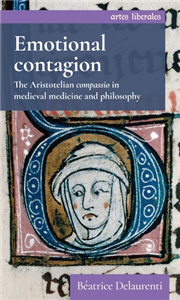Emotional contagion
The Aristotelian compassio in medieval medicine and philosophy
by Béatrice Delaurenti, Graham Robert Edwards
Description
More Information
Rights Information
Albania, Algeria, Angola, Argentina, Armenia, Australia, Austria, Bahrain, Belgium, Belize, Benin, Bolivia, Bosnia and Herzegovina, Botswana, Brazil, Bulgaria, Burkina Faso, Burundi, Cameroon, Canada, Cape Verde, Central African Republic, Chad, Chile, China, Colombia, Comoros, Congo [DRC], Congo, Republic of the, Costa Rica, Ivory Coast, Croatia, Czech Republic, Denmark, Djibouti, Ecuador, Egypt, El Salvador, Equatorial Guinea, Eritrea, Estonia, Ethiopia, Faroe Islands, Finland, France, French Guiana, Gabon, Gambia, Georgia, Germany, Ghana, Greece, Guatemala, Guinea, Guinea-Bissau, Guyana, Honduras, Hongkong, Hungary, Iceland, India, Indonesia, Iran, Iraq, Ireland, Israel, Italy, Japan, Jordan, Kazakhstan, Kenya, Kuwait, Latvia, Lebanon, Lesotho, Liberia, Libya, Lithuania, Luxembourg, Macau, China, Macedonia [FYROM], Madagascar, Malawi, Malaysia, Mali, Malta, Mauritania, Mauritius, Mayotte, Mexico, Mongolia, Montenegro, Morocco, Mozambique, Namibia, Netherlands, New Zealand, Nicaragua, Niger, Nigeria, Norway, Oman, Pakistan, Panama, Paraguay, Peru, Philippines, Poland, Portugal, Puerto Rico, Qatar, Reunion, Romania, Russia, Rwanda, Saint Helena, Sao Tome and Principe, Saudi Arabia, Senegal, Serbia, Seychelles, Sierra Leone, Singapore, Slovakia, Slovenia, Somalia, South Africa, South Korea, Spain, Sri Lanka, Sudan, Suriname, Swaziland, Sweden, Switzerland, Syria, Taiwan, Tanzania, Thailand, Timor-Leste, Togo, Tokelau, Tunisia, Turkey, Uganda, Ukraine, United Arab Emirates, United Kingdom, United States, Uruguay, Venezuela, Vietnam, Western Sahara, Yemen, Zambia, Zimbabwe, South Sudan, Cyprus, Palestine, Bangladesh, Cambodia, Liechtenstein, Azerbaijan, Jamaica, Kyrgyzstan, Dominican Republic, Myanmar, Monaco
Endorsements
When someone yawns or weeps, it often causes others to do the same. In the same way, shuddering, hunger, and sexual desire are all transmissible from one person to another. This book addresses how emotions can be contagious, spreading rapidly among people and resulting in physical effects. Medieval Latin had a specific name for this contagion: compassio ('compassion'). Etymologically, compassion means experiencing together the same 'passion', implying an involuntary reaction of the soul or the body imitating the reactions of others. This compassion-like mechanism intrigued medieval scholars. Ideas about it were examined in the fourteenth century by a series of savants commentating on Aristotle's Problems, and their notions held a particular place in scientific discourse. To this day, emotional contagion remains a topic of scientific enquiry and raises a number of philosophical, scientific, and anthropological questions. Emotional contagion is mysterious, and so it was in the Middle Ages. How could a single passion be both active and interactive, and what role could be assigned to the outside world in these emotional movements? This book sheds light on how medieval scholars conceived of the soul-body relationship and human interrelations and illuminates the twofold enigma: that of the trajectory of the term compassio, and that of explaining the phenomenon it denoted.
Reviews
When someone yawns or weeps, it often causes others to do the same. In the same way, shuddering, hunger, and sexual desire are all transmissible from one person to another. This book addresses how emotions can be contagious, spreading rapidly among people and resulting in physical effects. Medieval Latin had a specific name for this contagion: compassio ('compassion'). Etymologically, compassion means experiencing together the same 'passion', implying an involuntary reaction of the soul or the body imitating the reactions of others. This compassion-like mechanism intrigued medieval scholars. Ideas about it were examined in the fourteenth century by a series of savants commentating on Aristotle's Problems, and their notions held a particular place in scientific discourse. To this day, emotional contagion remains a topic of scientific enquiry and raises a number of philosophical, scientific, and anthropological questions. Emotional contagion is mysterious, and so it was in the Middle Ages. How could a single passion be both active and interactive, and what role could be assigned to the outside world in these emotional movements? This book sheds light on how medieval scholars conceived of the soul-body relationship and human interrelations and illuminates the twofold enigma: that of the trajectory of the term compassio, and that of explaining the phenomenon it denoted.
Author Biography
Béatrice Delaurenti is Associate Professor in Medieval History at the School for Advanced Studies in the Social Sciences (EHESS)
Manchester University Press
Manchester University Press is a leading UK publisher known for excellent research in the humanities and social sciences.
View all titlesBibliographic Information
- Publisher Manchester University Press
- Publication Date March 2025
- Orginal LanguageEnglish, French
- ISBN/Identifier 9781526168887 / 152616888X
- Publication Country or regionUnited Kingdom
- FormatPrint PDF
- Pages320
- ReadershipGeneral/trade; College/higher education; Professional and scholarly
- Publish StatusPublished
- Dimensions216 X 138 mm
- Biblio NotesDerived from Proprietary 5739
- SeriesArtes Liberales
- Reference Code15219
Manchester University Press has chosen to review this offer before it proceeds.
You will receive an email update that will bring you back to complete the process.
You can also check the status in the My Offers area

Please wait while the payment is being prepared.
Do not close this window.



